Academic Excellence
Graduates December 2015
Spanish Doctoral Dissertation Defense
Sara Pink
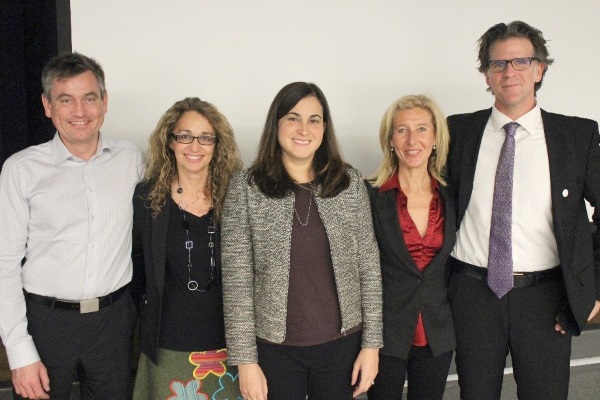
Dissertation title: "De Sevilla al jardín secreto: El espacio físico en la obra de Luis Cernuda"
Dissertation Chair: Carmen Pereira-Muro
Dissertation Committee:
Idoia Elola
Curtis Bauer
Julian Pérez (via Skype)
Lars W. Christensen, Dean's Representative
Master of Arts
Rasha Alkhrejah, Languages and Cultures – Applied Linguistics
Karlissa J. Black, Applied Linguistics
Mitchell Gries, Languages and Cultures – Applied Linguistics
Timothy J. Langston, Languages and Cultures - Classics
Kristina D. Mayer, Applied Linguistics
Seham Alsad, Applied Linguistics
Kelly Wells, Romance Languages - French
Bachelor of Arts
Languages & Cultures
Jessica Neill – Specialization - Russian
Spanish
Santa Monica Alpizar-Chavez
Hayden Bergman
Paul B. Bryson (Magna Cum Laude)
Chelsea Carlton (Cum Laude)
Lauren Choate
Daphne Delgado
Danielle Henderson
Michael D. Martinez
Jay Martinez-Garcia
Victoria Queneau (Magna Cum Laude with Highest Honors)
Gabriel Quinteros (with Honors)
Tomas A. Reyes
Francisco Regeiro
Crystal Rodriguez
Lacy Row (Magna Cum Laude)
Denise Tarango
Jorge Vega
Excellence Among Faculty
Women Faculty Writing Group
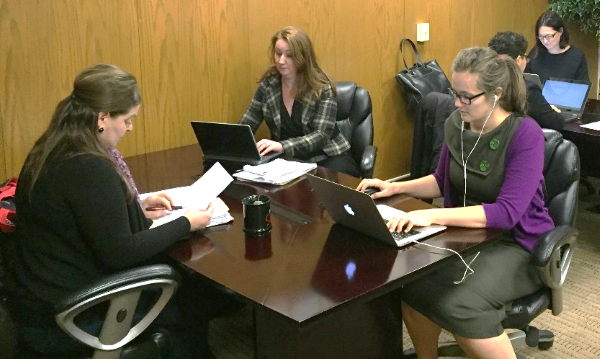
Elizabeth Sharp, Associate Professor Human Sciences, and Caroline Bishop, Assistant Professor Classics collaborated with the Women's Studies Department, the President's Gender Equity Council, and the University Writing Center to sponsor a women faculty writing group for 2015-16 that began in the second half of the fall semester. A group of 20 women faculty from all disciplines met for three hours a week throughout the semester including 3 from CMLL: Erin Collopy, Andrea Jonsson and Caroline Bishop. Participants networked, shared their research, gained effective writing and goal-setting strategies, and forged new connections. As a result, many peer-reviewed manuscripts and book chapters were completed.
Accomplishments:
Submitted 5 research articles to peer-reviewed journals
Submitted 1 book proposal to publisher
Submitted 1 book chapter
Submitted 4 conference papers
Submitted 3 article reviews
Prepared 2 seminar talks
Completed draft of a 20,000 word chapter for a monograph
Completed (or near completion) 5 manuscript drafts: to be submitted in spring 2016
To be submitted over winter break: 4 articles to peer-reviewed journals
Additional photos here
Scarborough Elected to MLA Council

Connie Scarborough, Professor of Spanish, was elected to represent Medieval Iberian studies on the Executive Council of the Modern Language Association. Her term begins in January 2016 and runs through the January 2021 convention. The first official meeting as a council member will be in January 2017 at the convention in Philadelphia.
Excellence Inside and Outside the Classroom
Classics Program Recreates Long Jump from Ancient Olympic Games
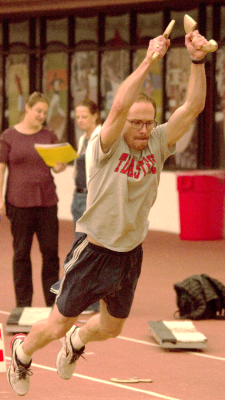
As excitement is mounting for the upcoming 2016 Summer Olympic Games in Rio de Janeiro, the faculty of Classics seized the moment by recreating the long jump according to the Ancient Greek way on November 21st, at the Texas Tech Athletic Training Center indoor track and field facility.
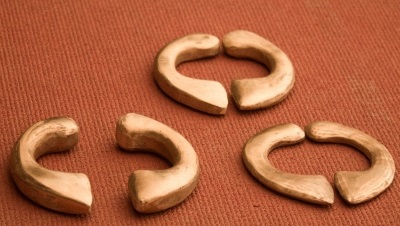
The exact method used to perform the long jump has been a mystery to scholars of ancient sports, particularly given the fact that jumpers carried small weights (halters) in their hands. Questions among scholars as to whether it was a standing or running jump, or a series of jumps as in the modern triple jump have surrounded the long jump. Thus, in hopes of revealing some new details on the way it was performed, the faculty organized performance of the jump in as close to ancient conditions as possible. David Larmour (Paul Whitfield Horn Professor of Classics) and Peter Miller (Visiting Professor in CMLL) teamed up to design an experiment involving volunteer jumpers (Phillip Guengerich [pictured above], Timothy Langston, Mark Moser, Campbell Roper) selected from TTU faculty and students who performed a series of jumps with varying weights while Miller and Larmour recorded, measured and filmed their feats.
Diane Wholey (Assistant Athletic Director – Track & Field Operations) generously offered the use of the Athletic Training Center (the "bubble") and helped with the running of the series of jumps. Moreover, to increase the authenticity of the experiment, the use of 2 dumbbell-like jumping weights was necessary; therefore, Hannah Friedman (Assistant Professor of Classics, CMLL) worked with William and Shannon Cannings, Texas Tech University School of Art, to design and build bronze jumping weights that are close to the ancient models.
While Larmour and Miller have not had time to fully process the data, some unofficial conclusions could be drawn during the experiment. The first is that the shape of the weights, the aerodynamics and ergonomics, matter a great deal. Other experiments similar to this have taken place at other universities, but they used modern dumbbells which are a completely different shape, often hitting the thigh or difficult to grip. During practice earlier in the week, TTU jumpers used dumbbells but stated that the halteres were much easier to use.
A second conclusion is that the jumpers' center of gravity was altered depending on which weight they used. This was evidenced by their landing imprints in the sand. Jumpers stated that they felt "pulled forward" which was to their advantage in the event that they lost their footing during the landing because they landed forward instead of backwards. The mark of measurement is customarily taken from the closest landed body part to the jump point.
Much work is left to be completed by the professors, so they will be running more trials in the future in order to collect more data. Larmour and Miller hope to produce preliminary results during the Olympics--Ancient and Modern week of events in April 2015 (4th-8th), which will culminate in a one-day Symposium on 8th April (open to anyone interested) on ancient Greek and Roman sports and games.
Stratton Develops and Offers New Spanish Course at the TTU Center, Seville, Spain: Practical Survival Spanish
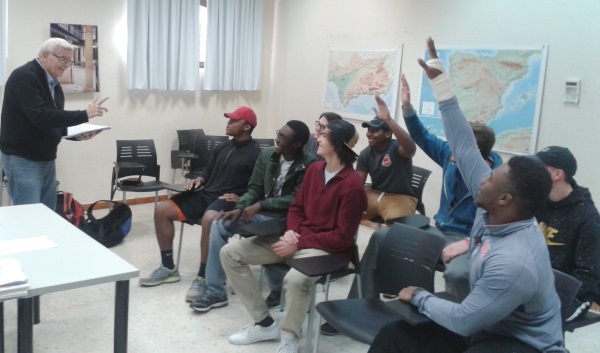
Dr. Lorum Stratton has developed and is teaching a new Spanish course for the Seville
Campus. The course is set up for students who are not majors nor minors in Spanish
but who are in Spain for a semester and want to learn necessary survival skills in
Spanish to enhance their stay in Seville and in Spain.
Drawing on his many years of experience in directing and teaching study abroad programs
in Mexico and Spain, Dr. Stratton is writing an original textbook specifically geared
to teach these survival skills. The textbook and course focus on the development of
speaking and listening skills and include special sections on 1) all-important survival
Spanish, 2) food and eating, 3) travel, and 4) living with families.
He taught a pilot class of one semester credit hour in fall 2014. The success and
positive feedback from that course led to the offering of a three hour course in fall
2015 for the Engineering students. There were 8 students enrolled. The class was a
resounding success.
Within the classroom experience, native speaking language assistants come into the class 2-3 times a week to help the students have a more real-life experience. Myriam Rubio, who has been an assistant for a number of years on the Seville campus states: "As language assistants, we have noticed that Dr. Stratton's method, based on simplified structures and expressions and specific vocabulary focused on everyday situations, has proved to be very effective and useful, since these students have reached a communicative performance similar to that achieved by the regular beginning Spanish students in the program. Furthermore, the learning process emphasized both speaking and comprehension skills, so that students could start communicating from the very beginning of the course. In our (she and the other language assistants) opinion the whole process has been a really positive experience for both the students and the language assistants." Two of the Spanish host moms told Dr. Stratton that this was the best semester they have had as far as communicating in Spanish with the Engineering students staying in their homes.
There has been an additional positive development to the class itself. Dr. Stratton has prepared an orientation session on Spanish skills for every student who arrives on the Seville campus to study. Within that orientation session, students are given four 3x5 cards which contain survival Spanish vocabulary and expressions for the specific areas noted above. These cards can be carried and used daily. Dr. Stratton comments that the development of these materials is a dream come true based on his 46 years of teaching and service, and hopes that this legacy will help thousands of students in future years.
GERM 2312: Literature of the Holocaust Exhibit Class Projects
Students in Dr. Belinda Kleinhans's GERM 2312 prepared class projects to represent the Holocaust depicting some reasons as to why the Holocaust happened, who was victimized, the resistance and how the Holocaust can be adequately represented 70 years after Auschwitz. This fall, the students' projects were displayed in the basement of the Foreign Languages Building on December 2 from 11:30 a.m. to 4:30 p.m. and on Friday, December 4, in the Ice House during the Lubbock First Friday Art Trail.
SPAN 4303: Advanced Spanish Conversation Students Perform Plays
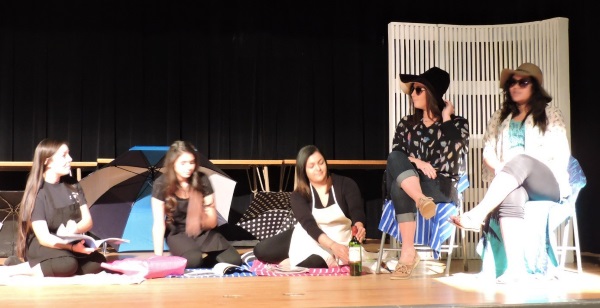
Dr. Sara Guengerich's undergraduate class, SPAN 4303: Advanced Spanish Conversation,
performed two plays in fall 2015. The plays were Ovaldo Dragún's Historia del hombre que se convirtió en perro
(1957) and Sergio Vodanovic's El delantal blanco (1964). The students who participated in these plays memorized their lines, prepared
all the props, and practiced for several weeks prior to the
events. All of them expressed that this was a fun and challenging learning experience.
Awards and Recognitions
Dr. Christopher Witmore Interviews for News of the National Humanities Center
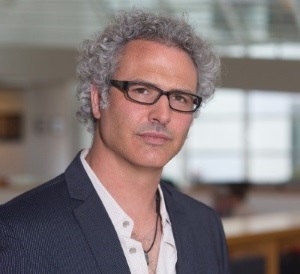
An interview entitled, "Moving through Our Pasts: Christopher Witmore on Reviving the Practice of Chorography" was published in the News of The National Humanities Center, Fall/Winter 2015 featuring Dr. Christopher Witmore. The interview sheds light on how his current project on land and human ecology in the Argolid and Corinthia, Greece involves chorography, the ancient practice of descriptive writing about a region and its qualities. Witmore attributes several contributing factors to use chorography as a methodological approach: his background on a small farm in rural California colored his relationship to land, to place, to people's investment; his undergraduate and graduate studies in anthropology, classics, and geography followed by rich life experiences, and access to scholarly resources. Witmore expounded on how taking notes of things as they are encountered, contemplating them, and incorporating them into an accumulated account brings him to the question: What do you do with it? Understanding that chorography requires refinement, one cannot be attentive to everything.
Focusing attention on his writings about Eastern Morea-the Peloponnese and the role chorography, Witmore realizes that movement is central to this method, understands the importance of a distinction between history and memory, and the implications for understanding space as much as time which was the demise of the Greek polis. Witmore concluded the interview by defining his aim in writing a chorography as a pre-disciplinary genre to achieve an understanding of these spatial metamorphoses and their implications for how one relates to ancient places.
Witmore, Christopher. "Moving through Our Pasts: Christopher Witmore on Reviving the Practice of Chorography." News of The National Humanities Center, Fall/Winter 2015: 7-10.
Graduate Student Advisory Council Elect - Hidetoshi Tanihara
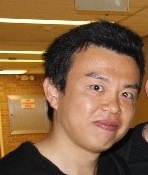
Tanihara, a Japanese graduate part-time instructor and MA Languages & Cultures: Applied Linguistics candidate, was elected as a member of the 2015 Graduate Student Advisory Council. His has established 3 main goals: 1) to provide practical information and support for international students to help develop themselves both academically and professionally, 2) to create a sense of community on campus for international students in order to build a network among themselves, 3) to create events for international students to experience cross-cultural interactions with domestic students and with the Lubbock community.
Student Publications
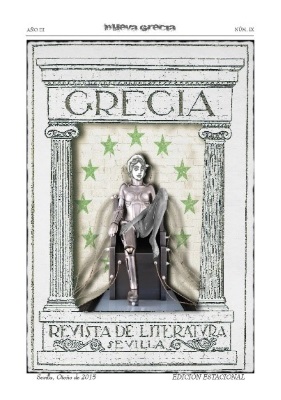
Jesus Ramirez, Ramirez, J. (2015). La bestia del Llano Estacado. Nueva Grecia. Revista Estacional de Literatura. 3 (9), 52-53.
This short story is about the Mustang in the Llano Estacado, Texas.
Graduate Student Presentations
Michael P. Boyles, MA Languages & Cultures – Classics candidate, presented a paper titled, "Antiquarians in the Levant" at the Texas Tech Graduate Arts & Humanities Conference on October 23.
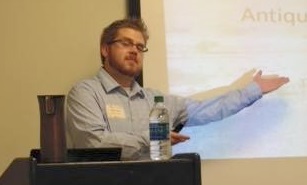
Emilie Mathis, MA Romances Languages - French candidate, presented a paper entitled, "Le Non-engagement des Auteurs de la Nouvelle Vague: Un Désaveu de la Condition Féminine" as part of the session Francophone Studied VIII: Representation of Women in Film and Theater at the 65th Mountain Interstate Foreign Language Conference in Charleston, SC, College of Charleston from October 15-17.
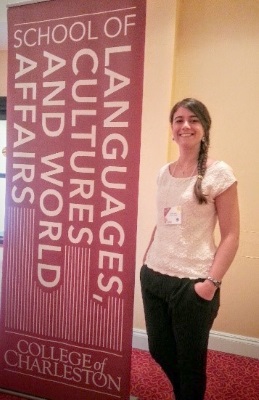
Rubén Varona, PhD candidate in Spanish, Presents at Two Conferences
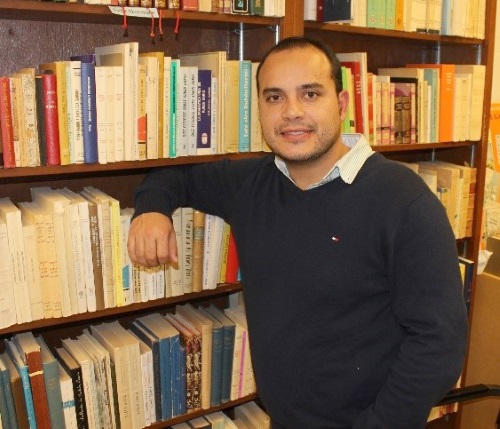
Varona presented a paper entitled, "¿Cómo se hornea una ficción criminal? La hora del cheesecake: presentación de una novella" at the 5th International Hispanic Crime Fiction Conference in Mexico City, Mexico from September 24-26.
Varona participated as a special guest at the Festival de la Palabra in Puerto Rico (October 22-25). In the framework of this prestigious literary event devoted to literature in Spanish, Varona presented his most recent novel titled, La hora del cheesecake, La Pereza Ediciones (2015). During the Festival, he also participates in the panel "Escribir en tiempos violentos", with well-known authors from the Hispanic World, and shares his experiences as a writer and scholar with high school students from the city of San Juan, and the academic community of The University of Puerto Rico, in Aguadilla.
Classical & Modern Languages & Literatures
-
Address
CMLL Building, 2906 18th St, Lubbock, TX 79409 -
Phone
806.742.3145

